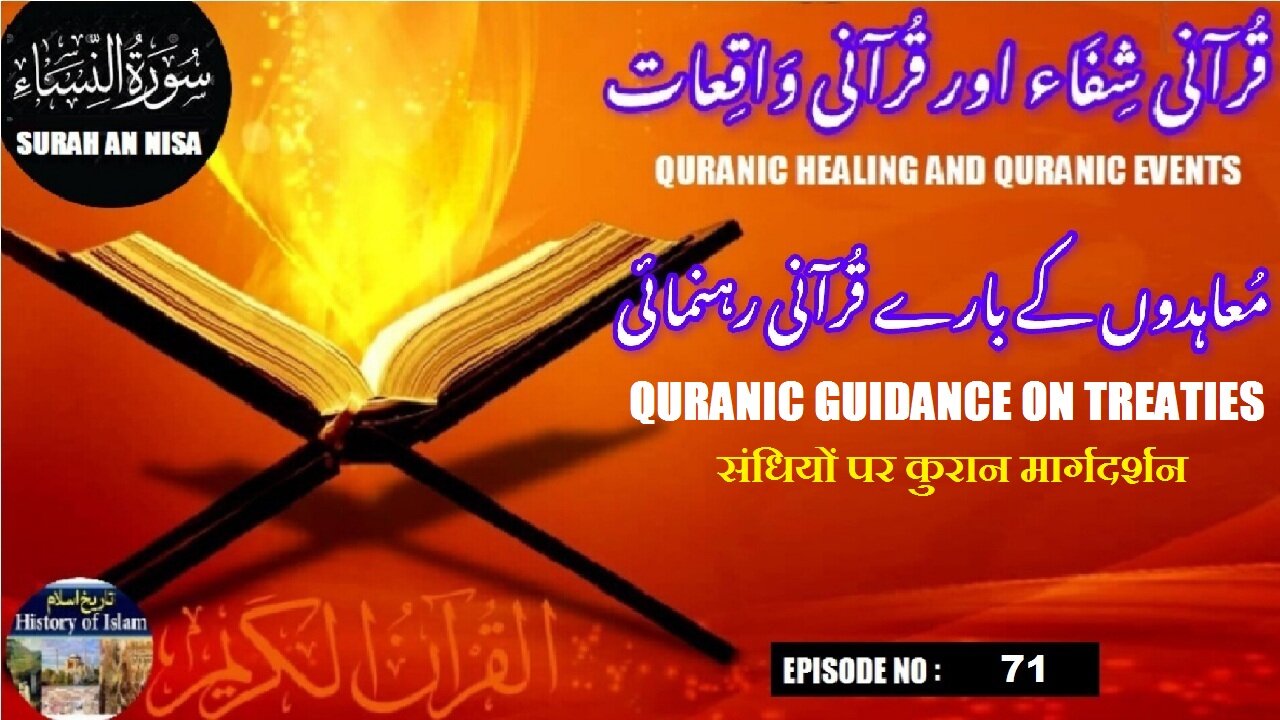Premium Only Content

Quranic Guidance on Treaties संधियों पर कुरान मार्गदर्शन معاہدوں کے بارے میں قرآنی رہنمائی
@islamichistory813 #healing #and #events #from #the #quran #historical #stories #and #events #quranicstories #selfhealing #success #stories #striking #events #in #history #quranstories, #storiesfromthequran #religious #creation #stories #trending #quran #short #historical #loves #historical #heroes #what #is #true #strength #calm #quran #recitation #for #babies #islamic #healing
Quranic Guidance on Treaties
Brothers, sisters, friends and elders Assalamu Alaikum, wa Rahmatullahi wa Barakatuhu, we are presenting the 71th episode of the Islamic informative video based on healing and events from the Holy Quran, and in this video we will describe,Qur’anic Guidance on Treaties
The Qur’anic verses 4:90–91 address an important aspect of the early Muslim community’s dealings with neighboring tribes and groups, particularly concerning the observance and violation of treaties. These verses provide guidance on how Muslims should interact with tribes that have established agreements of peace and cooperation, reflecting a nuanced approach to diplomacy, conflict, and ethical conduct during a period marked by tribal tensions and frequent hostilities. The instructions given in these verses balance firmness and justice with mercy and the pursuit of peace, emphasizing that behavior and intentions determine the nature of relationships between the Muslim community and others.
Verse 4:90 begins by acknowledging the existence of some groups who appeared to have established peace treaties with Muslims but whose actual intentions and loyalties were questionable. It states, “Except for those who join a people between yourselves and whom is a treaty or those who come to you with hearts restraining them from fighting you or fighting their own people.” This verse recognizes that among the tribes surrounding the Muslim community, some were bound by formal agreements promising peace and non-aggression. For those who genuinely adhered to these treaties or came with peaceful intentions, Muslims were commanded to treat them with fairness and restraint. The emphasis on “hearts restraining them” highlights the importance of genuine peaceful intent, not merely outward appearances or temporary convenience.
This nuanced approach underscored the principle that treaties and peaceful relations were not just formalities but reflected true commitments and mutual respect. The early Muslims were instructed to honor treaties with sincerity, as breaking agreements without cause would undermine the community’s integrity and invite further hostilities. The Qur’an’s guidance promoted trust-building and stability, encouraging the Muslim community to uphold justice and maintain peace whenever possible.
However, the verses also clearly distinguish between those who honored their agreements and those who violated them or harbored hostile intentions. Verse 4:91 warns against trusting those who “break their oaths after their treaty and defame your religion.” It says, “You find others who want to obtain security from you or from their people, while they have already determined to attack you.” This verse highlights the duplicity of some tribes who pretended to seek peace or security but secretly plotted against the Muslims. Such behavior was a clear breach of trust and a violation of the sanctity of treaties. These groups, the Qur’an instructs, should not be granted trust or leniency because their actions threatened the safety and stability of the Muslim community.
The Qur’an’s treatment of these violations demonstrates a realistic and pragmatic approach to international relations and tribal diplomacy. It recognizes that not all treaties are honored in good faith, and that vigilance and self-defense are necessary in the face of deceit and treachery. Yet, this vigilance does not justify indiscriminate violence or betrayal; rather, it requires careful assessment of intentions and behavior. The Muslim community was thus encouraged to differentiate between genuine peace partners and those who sought to undermine them, responding accordingly with justice and firmness.
This framework established by the Qur’an was particularly significant given the context of seventh-century Arabia, where tribal allegiances were often fluid, and betrayal could quickly lead to violent reprisals. The early Muslims, surrounded by hostile tribes and powers, needed clear ethical guidance on how to navigate these complex relationships without compromising their values. The verses emphasized that Muslims should honor peace treaties, respect those who came with sincere peaceful intentions, and exercise caution toward those who violated agreements or threatened aggression.
Beyond its historical context, these verses offer timeless lessons about the importance of integrity in agreements and the ethical considerations in diplomacy and conflict. They underline that peace must be based on genuine respect and commitment, not on convenience or deceit. The Qur’an’s guidance encourages maintaining peaceful relations whenever possible but also preparing to defend the community against betrayal and aggression. This balanced approach can be applied to modern international relations, reminding leaders and communities of the critical role of trust, honor, and vigilance in fostering lasting peace.
The Qur’anic stance also reflects broader Islamic ethical principles regarding justice, trustworthiness, and the protection of innocent life. Treaties are sacred contracts that bind parties to mutual respect and obligations. Violating these agreements is not only a breach of trust but also a sin against God and humanity. Therefore, Muslims are called to be exemplars of honesty and reliability in their dealings with others, reinforcing the moral foundation upon which social and political relations rest.
In summary, verses 4:90–91 of Surah An-Nisa provide detailed guidance on the treatment of tribes and groups with whom the Muslim community had treaties. These verses emphasize honoring agreements and treating peaceful groups with justice and kindness while warning against those who violate treaties and harbor hostile intentions. This guidance reflects a deep understanding of the complexities of tribal politics and international relations, advocating a balanced approach that prioritizes peace but remains vigilant against treachery. The principles derived from these verses continue to resonate as foundational values in ethical diplomacy and conflict resolution, reminding Muslims and all people of the enduring importance of trust, justice, and integrity in human affairs.
With this, we ask for your permission until tomorrow and pray to Allah Almighty to grant us the ability to act on the Quran and Hadith, Amen
Allah Hafiz
============================
-
 9:47
9:47
ISLAMIC HISTORY
10 hours agoWhy is Surah Yunus named after Prophet Yunus سورہ یونس کا نام حضرت یونس کے نام پر کیوں رکھا گیا؟
5 -
 6:49:16
6:49:16
Dr Disrespect
7 hours ago🔴LIVE - DR DISRESPECT - BLACK OPS 7 MULTIPLAYER GAMEPLAY - NEW!
117K7 -
 LIVE
LIVE
MattMorseTV
1 hour ago🔴CHILLING + TALKING🔴
306 watching -
 1:26:12
1:26:12
Steven Crowder
9 hours agoThe Left is Violent (Part 2) | Change My Mind
384K671 -
 2:11:35
2:11:35
Pop Culture Crisis
3 hours agoElon Declares 'CANCEL NETFLIX' Trump Threatens Hollywood, Bad Bunny Superbowl Boycott? | Ep. 927
9.36K1 -
 3:26:05
3:26:05
Barry Cunningham
4 hours agoPRESIDENT TRUMP IS READY TO GO SCORCHED EARTH! SHUTDOWN DAY 2 BRIEFING!
17.5K20 -
 DVR
DVR
The Trish Regan Show
1 hour ago🚨Trump’s TRIUMPH! DEMS HUMILIATED on LIVE TV as SHUTDOWN BLAME BACKFIRES!
7.4K7 -
 1:39:14
1:39:14
Dr. Drew
6 hours agoFL First Lady Casey DeSantis: Florida Ending ALL Vaccine Mandates, Including For Schools w/ FL Surgeon General Dr. Joseph Ladapo & Tom Renz – Ask Dr. Drew
44.7K5 -
 23:51
23:51
Stephen Gardner
2 hours ago🔥Trump RAGES! Putin’s Plot REVEALED — Bill O’Reilly Breaks His Silence!
11.8K23 -
 1:14:58
1:14:58
vivafrei
7 hours agoHe Was There! Charlie Kirk Assassination Analysis & Conspiracy Debunking w/ Andrew Piskadlo!
74K70
